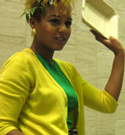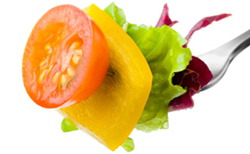Vegetarian Chef Pushes Slow Food, not Soul Food
By Sarah Damian New America Media | Last updated: May 20, 2010 - 1:48:56 PMWhat's your opinion on this article?
“I want vegetarian food!” some of the teenagers scream when vegan chef and raw foodist Lauren Von Der Pool comes to visit their school. The 25-year-old owner of newly opened Café Green grew up in Washington, D.C., and has returned to help heal her community by teaching inner-city youth how to create healthy gourmet food on a budget.

Lauren Von Der Pool Photo: New American Media
|
After watching Von Der Pool make a raw fruit smoothie in his dropout prevention class in Southeast Washington, D.C., 8th grade student Dante Lewis began making the same thing at home for himself and his sister.

‘Soul food is slave food...Eating your typical soul food every day isn’t good. Cornbread, meat, do you know how hard that is on your digestive system?’ —Lauren Von Der Pool |
Another middle-school student, Danyelle Franklin, did the same thing. “Vegetarian sandwiches are now my favorite food,” she said.
Von Der Pool says many people don't expect such a positive reaction from teens, but she's not surprised. The chef argues that the norm of eating processed foods is rooted in the lack of available options.
The Southeast quarter of D.C. has fast food and carry-out on every corner, she said, but “there's only one grocery store in Southeast. It's sick.”
According to D.C. Hunger Solutions (DCHS) director Alex Ashbrook, neighborhoods east of the Potomac River, which are primarily Black, are the areas where there is less access to quality food.
“In Ward 8, there's one grocery store for every 23,000 residents, as opposed to Ward 3 that has a grocery store for every 7,000,” Ashbrook said during a panel discussion last Friday.
A recent DCHS report shows a strong correlation between the lack of food access in Southeast and its high rate of obesity and diabetes.
Tambra Stevenson with the Metropolitan Washington Public Health Association, also on the panel, said her goal is to see candy wrappers on the sidewalks in Southeast replaced with orange and banana peels.
“African-Americans and those in the Caribbean were brought over because of the sugar cane,” Stevenson said. “So now you're contributing to the same thing that enslaved your own people. You're enslaving your brain and killing yourself softly with a sugar addiction.”
Both Stevenson and Von Der Pool believe the community needs to break away from foods which are widely associated with Black culture.
“Soul food is slave food,” Von Der Pool said. “Eating your typical soul food every day isn't good. Cornbread, meat, do you know how hard that is on your digestive system?” She insists that organic, fresh produce is what's really good for the soul.
Von Der Pool argues that switching to a healthier vegetarian diet can lead to major health benefits in a short period of time. A healthier diet can result in raised self-esteem and greater alertness, she said, because what a person puts into his or her body affects their mental and emotional consciousness.
She also contends that young people aren't hard to convince. “Kids love good food, they just need to be exposed to it.”
There are plenty of stereotypes regarding vegetarian and vegan food, and Von Der Pool helps break them down during her food demonstrations.
“At first, I thought it was nasty,” Lewis said of his initial impression of vegetarian food. “But it's good.”
Hands-on experience with fruits and vegetables not only inspires the students to eat healthier but also to see themselves not just as consumers but producers.
Robert Egger, founder and president of D.C. Central Kitchen, said young African American kids he works with see chefs as White people with French accents. “So chefs to them are this separate thing they can't be; there's a disconnect.”
Lauren Von Der Pool believes her age and background can help youth break away from those stereotypes.
“Because I'm young and I look like them and I can speak like them, I can get down you know, they're receptive,” she said.
INSIDE STORIES AND REVIEWS
-
-
About Harriett ... and the Negro Hollywood Road Show
By Rabiah Muhammad, Guest Columnist » Full Story -
Skepticism greets Jay-Z, NFL talk of inspiring change
By Bryan 18X Crawford and Richard B. Muhammad The Final Call Newspaper @TheFinalCall » Full Story -
The painful problem of Black girls and suicide
By Charlene Muhammad -National Correspondent- » Full Story -
Exploitation of Innocence - Report: Perceptions, policies hurting Black girls
By Charlene Muhammad -National Correspondent- » Full Story -
Big Ballin: Big ideas fuel a father’s Big Baller Brand and brash business sense
By Bryan Crawford -Contributing Writer- » Full Story






 Click Here Stay Connected!
Click Here Stay Connected!








